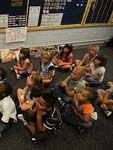







Introduction What About Freire? The Pink Monkey Psst! Wanna Buy A...? And His Pants Are Ugly Conclusions Opinions References and Credits |
Reading Kelly
Ritter’s Who
Owns School?
took me back to last spring, specifically to an hour I spent roaming my
first-year composition classroom supervising (sort of) my students'
composing of portfolio cover letters. As part of the FYC
curriculum at my school, we ask students to reflect on their
performance in the class; as part of my own take on the assignment, I
ask them to write a narrative that connects their writing experience in
my class with their writing experience in high school. While I’m
aware of the potential pitfalls of such an assignment—e.g., students
think you expect a conversion narrative and will therefore write
one—as well as of the potential suck-up factor, I still think that,
generally, my students are pretty honest. The most revealing
sections of their narratives are typically those in which they talk
specifically about their high school teachers and classes: while
sometimes there are anecdotes about teachers they initially thought
would be too hard for them, but who (conversion-narrative alert!)
pushed them to do better, there are also anecdotes about the teacher
they never managed to please. Often there are stories about how much
better their creative writing classes were than their literature
classes. And occasionally there’s an anecdote about an assignment that I, now well past 40, had when I was in high school. On this particular day, as I circulated around the room, a student raised her hand and asked: "What's that book with the green light at the end of the dock?" I told her. And then I said: "They're still giving that explain-the-symbolism-of-the-green-light assignment?" She rolled her eyes and nodded. Now, I'm the mother of a high school sophomore, and why students are still being required to read novels that nobody reads outside of a high school classroom—John Knowles' A Separate Peace springs to mind—is a mystery to me. The Great Gatsby doesn’t necessarily fall into that category, and it could be argued that nobody ever picked up Shakespeare just for grins, either. But that doesn’t excuse or explain the phenomenon of eternal assignment recycling, and the accompanying student disenchantment with high school English, which seems—if my student narratives are any indication—to have increased over the last five years. What I have difficulty understanding is why nobody has figured out that it’s not a great idea to keep giving the same assignments over and over and over again because, you know, maybe, at some point, such assignments will become meaningless to the students. |